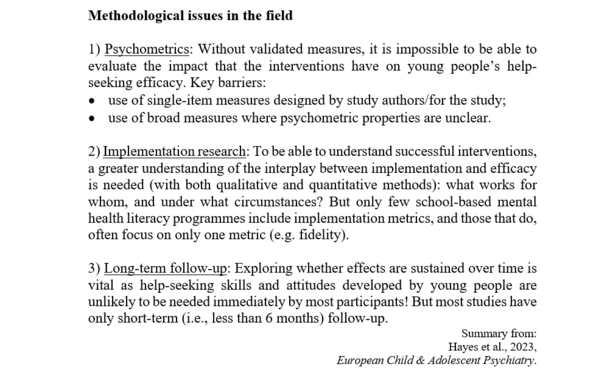Jan R. Boehnke · @jrboehnke
172 followers · 301 posts · Server mastodon.socialLast week "Quality of Life Research" #ISOQOL published 7 articles:
https://link.springer.com/journal/11136/online-first
For example:
#Psychometrics and population reference values for the Hungarian PROMIS-29+2:
https://link.springer.com/article/10.1007/s11136-023-03364-7
Estimating meaningful thresholds for multi-item questionnaires using #IRT:
https://link.springer.com/article/10.1007/s11136-023-03355-8
And to continue previous week's reading on #UTI, a #SysReview of Patient-reported outcome measures:
https://link.springer.com/article/10.1007/s11136-023-03358-5
#isoqol #psychometrics #irt #UTI #sysreview #hrql
Jan R. Boehnke · @jrboehnke
167 followers · 295 posts · Server mastodon.socialAn #ISOQOL editorial by Caroline Terwee presents a #SysReview offering a conceptual clarification regarding minimal important change estimates:
https://link.springer.com/article/10.1007/s11136-021-02925-y
An important section highlights that not all patients may be classified correctly with this approach. An MIC value refers to the average of a group of patients:
"In clinical practice, the MIC value should therefore be considered a probabilistic value, rather than a deterministic cut-point."
#isoqol #sysreview #hrql #feedback
Jan R. Boehnke · @jrboehnke
143 followers · 180 posts · Server mastodon.socialLast week "Quality of Life Research" published 3 articles:
https://link.springer.com/journal/11136/online-first
For example:
A #SysReview aggregating 76 studies on the current use of the EORTC QLQ-NMIBC24 and QLQ-BLM30 questionnaires for the assessment of health-related quality of life in bladder cancer patients:
https://rdcu.be/c3WNv
One conclusion is that that studies assessing the validity and reliability of both modules in large patient cohorts remain scarce.
#sysreview #hrql #psychometrics
Jan R. Boehnke · @jrboehnke
139 followers · 173 posts · Server mastodon.socialWhen #PeerReview identifies discrepancies between a manuscript and its respective #Registration, changing the registration is usually the worst possible option.
Community approaches to this differ, but I would expect to fare well with a section on "Deviations from the Registration".
#peerreview #registration #nightshifteditor #sysreview #rct #trial #RegisteredReports
Jan R. Boehnke · @jrboehnke
135 followers · 149 posts · Server mastodon.socialJan R. Boehnke · @jrboehnke
132 followers · 130 posts · Server mastodon.socialA #SysReview from the "Education for Wellbeing" project investigated the impact of universal, school-based interventions on help-seeking:
https://link.springer.com/article/10.1007/s00787-022-02135-y
We found tentative evidence that interventions impacting interpersonal attitudes produced small effect sizes when measured 3-6 months post intervention; and for intrapersonal attitudes, this remained at 3–6 month follow-up.
Some methodological findings in the picture below.
#sysreview #psychometrics #mentalhealth
Jan R. Boehnke · @jrboehnke
127 followers · 108 posts · Server mastodon.socialJanuary issue of
Quality of Life Research:
https://link.springer.com/journal/11136/volumes-and-issues/32-1
24 papers on a range of clinical & research #HRQL topics. For example:
#SysReview, Effectiveness of respiratory muscle training in internal and central nervous system disorders:
https://link.springer.com/article/10.1007/s11136-022-03133-y
#SysReview, measurement properties of outcome measures in adult patients with ankle fractures:
https://link.springer.com/article/10.1007/s11136-022-03166-3
HRQL outcomes experienced by children born very & extremely preterm at 5yrs of age:
https://link.springer.com/article/10.1007/s11136-022-03217-9


